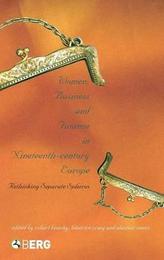
|
Women, Business and Finance in Nineteenth-Century Europe: Rethinking Separate Spheres
Hardback
Main Details
| Title |
Women, Business and Finance in Nineteenth-Century Europe: Rethinking Separate Spheres
|
| Authors and Contributors |
Edited by Robert Beachy
|
|
Edited by Beatrice Craig
|
|
Edited by Alastair Owens
|
| Physical Properties |
| Format:Hardback | | Pages:256 | | Dimensions(mm): Height 234,Width 156 |
|
| Category/Genre | Economic history |
|---|
| ISBN/Barcode |
9781845201845
|
| Classifications | Dewey:940.28 |
|---|
| Audience | | Tertiary Education (US: College) | |
|---|
| Illustrations |
26 tables, bibliography, index
|
|
Publishing Details |
| Publisher |
Bloomsbury Publishing PLC
|
| Imprint |
Berg Publishers
|
| Publication Date |
1 December 2005 |
| Publication Country |
United Kingdom
|
Description
Looking at women, business and finance in the long nineteenth century, this book challenges our traditional understanding of 'separate spheres'--whereby men operated in the public world of work and women in the private realm of the domestic. Drawing on case studies throughout Europe, the authors reveal that there was much greater diversity in women's economic experience across all social strata than has previously been understood. International contributors take a new look at women's roles in finance and investment, family-owned businesses, retailing, service activities, and the artisanal trades. They reveal that elite and middle-class women often manipulated financial resources in a highly sophisticated manner. Family-owned businesses and retail trade geared to women, such as grocery and fashion, also offered women opportunities. Throughout, the authors consider the impact of industrialization on women's economic agency. We learn about women in the accommodation business in London, female entrepreneurs in Italy, prostitutes in Germany, family businesses in Sweden, women in publishing in Spain and much more.
Author Biography
Robert Beachy is Assistant Professor of History at Goucher College, USA. Beatrice Craig is Associate Professor of History at the University of Ottawa, Canada. Alastair Owens is Lecturer in Geography at Queen Mary, University of London.
Reviews'Provides a wealth of insights into the financial agency of businesswomen in the complex economic structures of nineteenth-century Europe. The compelling and lucid case studies will make an excellent contribution to the reassessment of gender roles in this period.' Kathryn Gleadle, Oxford University 'Women, Business and Finance in Nineteenth-Century Europe brings together some of the best scholarly work on the history of women in business. Sophisticated, nuanced, and ever alert to the contradictory workings of gender, this wonderfully accessible collection convincingly challenges the conventional wisdom of separate spheres.' Wendy Gamber, Indiana University 'Through this collection of cutting-edge research, expertly framed by the editors, the analysis of both women's contribution to financial practice and gender relations in business in the European past is taken to a new level.' Katrina Honeyman, University of Leeds 'Highly original material and well researched--providing the reader with unusual insight into the role of women in business in various European countries.' Moira Donald, University of Exeter 'Historians relish irony especially when it involves an oppressed group subverting the institutions of oppression to create their own economic and social space. This collection of essays gives the idea of 'separate spheres' just such an ironic turn.' Jane Humphries, Business History 'This collection highlights not just the contradictions inherent in the separate spheres model and the ways in which it was resisted and transgressed by petit-bourgeois and middle-class women, but also the manner in which it was refigured and sometimes adopted by women themselves in order to promote their economic activity in particular areas at certain times. The editors of this volume have brought together a lively and engaging selection of essays to illustrate these points and in so doing have helped to ensure that interest in the field of women's work and enterprise will remain buoyant.' History: The Journal of the Historical Association (July 2007)
|